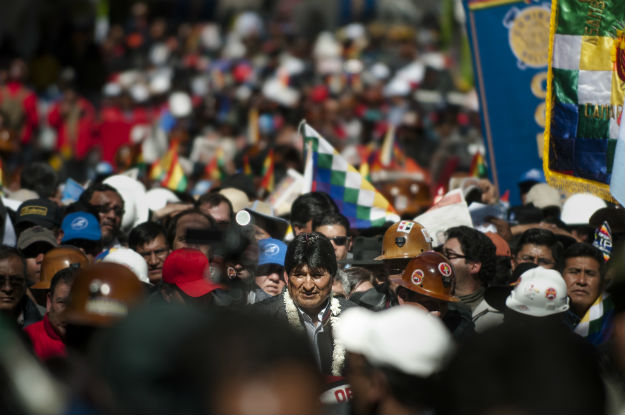An estimated 3,000 climate activists will arrive in the Bolivian town of Tiquipaya this weekend for the World People’s Conference on Climate Change and Defense of Life. Also in attendance: Some 3,000 police officers, tasked with “securing” the conference in a sign of the increasingly troubled relationship between Bolivia’s President Evo Morales and the indigenous and rural groups whose interests he once vowed to protect.
The People’s Conference is an attempt to promote civil society voices on climate change ahead of a December deadline for world leaders to deliver a new global climate agreement through the United Nations. Yet a number of Bolivian civil society groups are wary after previous efforts had little practical effect, and many are angry over what they see as Morales’ hypocrisy on climate and environmental issues.
After UN climate negotiations in Copenhagen failed to deliver a global agreement in 2009, the Bolivian government organized a similar “people’s” conference the following year. The agreement that emerged included an ambitious target to reduce greenhouse gas concentrations, but looked remarkably similar to official material that was released prior to the conference, raising questions about how much of it was “precooked” by the government.
The heavy security presence planned for this year’s People’s Conference reveals a fractious environment in Bolivia, where civil society groups are speaking out against government policies. A number of indigenous groups are planning an unofficial alternative space to protest the conference.
One reason for their criticism is the Bolivian government’s decision to pass decrees earlier in the year to open up protected areas for oil and gas exploration. Bolivia’s public defender’s office condemned the decrees, saying they “disavow more than 50 years of indigenous struggle to be recognized as the owners of their territory and as active subjects of the state.”
Following these decrees, civil society groups voiced their concern as well. In response, President Morales threatened to evict any civil society organization or foundation that “harms the exploration of natural resources.” Recently, the government denied the renewal of legal documents required by 38 national organizations to operate in the country, and the government accused some organizations of disseminating false information.
Bolivia has yet to submit a plan to reduce greenhouse emissions (known officially as an Intended Nationally Determined Contribution) to the UN ahead of December’s climate conference in Paris, despite the fact that countries with less economic capacity and lower total emissions have already done so. There has also been little transparency about the government’s plans and no public consultation process has taken place.
But there is still time for the People’s Conference to bear fruit, and for Bolivia to play its part in crafting a global response to climate change. First, civil society groups and activists must be given sufficient freedom and space to directly contribute to the conference’s final statement. Governments cannot play an overbearing role or strike text from the agreement they do not like. Second, all civil society and indigenous organizations must be allowed to participate – not only those groups which the government deems sufficiently friendly. Finally, the government should hold a dialogue with civil society and indigenous peoples’ organizations about Bolivia’s national climate plan for Paris. With thousands of civil society actors in attendance, the conference presents an invaluable opportunity to have a conversation about the country’s climate change plans and to encourage other countries such as Venezuela to also engage in a similar process.
Bolivia’s efforts to organize this conference are timely, as the promotion of climate justice and sustainable development issues are central to the negotiations for a new global agreement on climate change. However, this type of rhetoric on the international stage is largely meaningless if there is no follow through at home.
—
Guy Edwards is Research Fellow at the Institute at Brown for Environment and Society and Codirector of the Climate and Development Lab. He is co-author of a new book to be published by MIT Press this November called A Fragmented Continent: Latin America and the Global Politics of Climate Change. Camila Bustos is a researcher at Brown University’s Climate and Development Lab and lead researcher at the think tank Nivela. The opinions expressed in this article are the sole responsibility of the authors and do reflect those of Brown University or Nivela.






